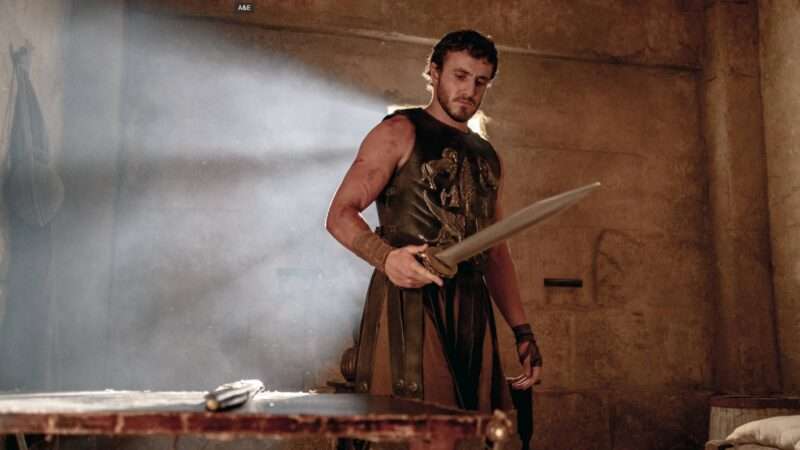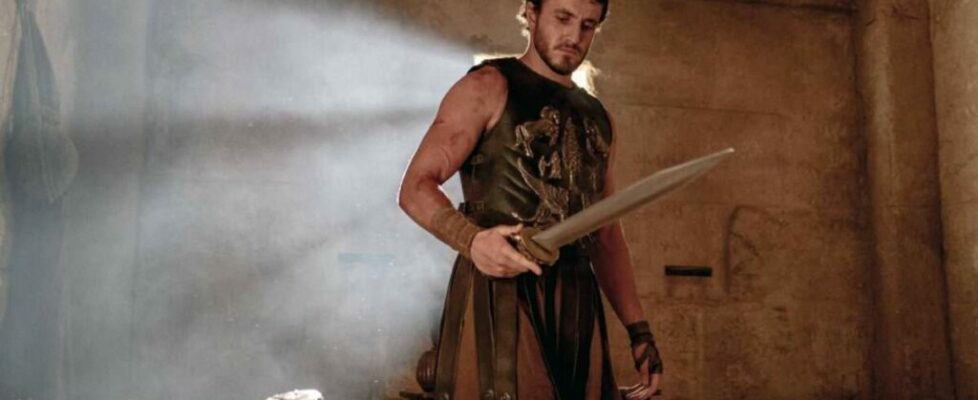Gladiator II Is a Lavish, Empty Spectacle

When Gladiator hit theaters in the summer of 2000, there were no post-credits scenes teasing sequels. There were no plans for a Gladiator expanded universe. The very idea of a post-credits scene or an expanded universe would have been strange, as the superhero movie boom was still in its primordial stage, and neither of those concepts had found their way into moviegoing and moviemaking parlance. The first Gladiator was just a movie—a crowd-pleasing, sword and sandals epic for the modern age. It had a beginning, a middle, and even an end. It won Best Picture, and everyone went on with their lives. There wasn’t supposed to be another one.
And yet, now, 24 years later, there is, somehow, for some reason, another one.
The question how is easy enough: Director Ridley Scott decided to make another one.
Why is a harder question to answer: Scott is in his 80s, but he’s made 10 movies over the last dozen years, several of which have revisited themes and settings from his earlier work. Maybe, like so many men, he’s obsessed with the Roman empire? Perhaps he had more to say on the subject of premodern gladiators?
Gladiator II is certainly more Gladiator: The action scenes are grander, more ambitious, emboldened by advances in special effects and Ridley Scott’s late-career confidence as a director. The first Gladiator gave viewers a man fighting a computer-generated tiger with a Roman short sword. The sequel gives viewers a gang of chained-up gladiators fighting off wild monkeys with nothing but chains. There’s a sequence where a rhinoceros is ridden into a gladiator pit like a medieval tank, and another where the Colosseum is flooded so that miniature boats can stage a water battle, complete with sharks.
But more Gladiator is not necessarily better Gladiator. Yes, Scott’s lavish set pieces are impeccably produced. But there’s no urgency to the story, no emotional pull, since most of the story is just a flat replay of the first film’s major beats.
Once again, we start with a young man who has a grudge against Rome after its army kills his wife. Instead of Russell Crowe’s Maximus, however, we get Paul Mescal’s Lucius, whose connections to Lucilla (Connie Nielsen, reprising her role from the original) and the first film become clearer as the film goes on. Lucius ends up in the arena, making his way toward Rome, with the hope of killing Marcus Acacius (Pedro Pascal), the general behind the attack that killed his wife.
Mescal looks the part, but his canned revenge storyline leaves him very little to do except survive various battles. Worse, he lacks Crowe’s gruff gravitas, which anchored so much of the first film.
For screen presence, the film turns to Denzel Washington, as Macrinus, the owner and overseer of a gladiator crew. Macrinus has plans and ambitions of his own, and the movie is at its best when allowing Washington to chew Scott’s elaborately designed ancient Roman scenery. Washington gins and winks and dances through his scenes, taking obvious pleasure in show off-y line readings. He is so much more magnetic than anyone else on screen that he practically rides off with the movie. A film fully focused on his story, and the political machinations he attempts to set in motion, would have been far more interesting.
From time to time, Gladiator II threatens to become a contest of ideas, with Washington’s scheming slaver viewing it as a degenerate society that can only be tamed by will and raw desire for power, and Mescal’s Lucius representing the dream of a free and decent Rome that echoed through the first film. Scott is a cantankerous humanist, and his recent films, especially, have taken aim at power-mad, ambitious men and the carnage they leave in their wake. But developing this notion would have shifted the drama away from the gladiatorial arenas and the elaborate battles Scott stages within them.
The main reason Scott seems to have made this late-breaking sequel, then, seems rather prosaic: He wanted more swords, more sandals, more rhinos and elephants, and flooded fighting pits. He knew how fondly audiences recalled the first film, and he’s never been able to resist staging another grand historical spectacle. Scott wanted a sequel because he wanted more Gladiator, too.
The post <i>Gladiator II</i> Is a Lavish, Empty Spectacle appeared first on Reason.com.
